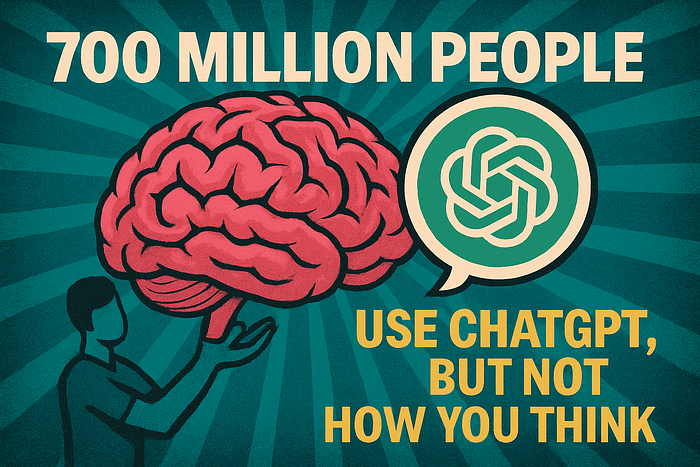
From Oppenheimer to Generative AI: Valuable Takeaways for Enterprises Today
Last Updated on November 6, 2023 by Editorial Team
Author(s): Emil Novakov
Originally published on Towards AI.
From Oppenheimer to Generative AI: Valuable Takeaways for Enterprises Today
I spent 3 hours last weekend in the theaters watching the latest blockbuster — Oppenheimer. Even though I knew the entire storyline and how it ended, I was still at the edge of my seat, watching scene by scene, marveling at Christopher Nolan’s reinterpretation. As I left the cinema, I began to wonder how AI today is akin to the Manhattan Project in Los Alamos.
The landscape of innovation has evolved dramatically ever since the days of J. Robert Oppenheimer, the brilliant scientist behind it all. While this historical context may seem distant, the lessons drawn from Oppenheimer’s approach to problem-solving and innovation are relevant for enterprises navigating this new era of Generative AI. As we traverse the realms of artificial intelligence in hopes of keeping up or leveraging them, Oppenheimer’s principles can be a valuable guiding light to shape the strategies and practices of modern businesses.

Embrace Curiosity and Interdisciplinary Collaboration, not Compartmentalization
As Oppenheimer traveled from state to state to seek the best scientists in each field, you can see how his work was not confined to a single discipline. He needed physicists, mathematicians, engineers, and more. Oppenheimer saw the limits of compartmentalization, as repeated in the movie by Colonel Leslie Richard Groves, as a security strategy to isolate all departments early on and had to advocate for weekly discussions.
Similarly, in today’s enterprises, embracing interdisciplinary collaboration is crucial for AI’s potential to unfold — data scientists, designers, domain experts, engineers, product developers, sales, marketing, and legal teams. All these different departments with diverse backgrounds must unite to unravel complex challenges. Developers who work on the product won’t know exactly what clients think they need. Still, sales professionals who interact with clients daily will have that intel. This knowledge needs to be shared across teams, and this fusion of different perspectives drives creativity, innovation, and the development of cutting-edge AI solutions.
Adopt AI earlier, not later
Being 18 months ahead of competing projects gave Oppenheimer and his team a massive advantage in experimenting with and resolving complex challenges, which ultimately contributed significantly to their triumph.
Businesses could also use the early adopter advantage in generative AI by integrating it across their value chain to develop unique products, boost efficiency significantly, and gain a competitive advantage in the market while establishing a solid brand. Not all your employees will be open to trying out these new skills. But suppose there is a group of them. In that case, enterprises should encourage that, set up a cross-team task force, and even take them off a few projects so that they can devote their time to discovering how generative AI can boost productivity.
Sitting back and letting it play out won’t get you anywhere. Seeing how AI is advancing now — 1 month later could mean 1 year slower in company-wide adoption.
Emulate a Growth Mindset
What’s a growth mindset? Oppenheimer’s unwavering commitment to learning and growth led to his transformative contributions. Similarly, large corporations must foster a growth mindset that encourages continuous learning and adaptation.
With the digital world moving so fast, the old tried, and tested ways no longer work today. Generative AI is an ever-evolving field, and organizations that prioritize upskilling, knowledge sharing, and staying updated on AI advancements are better positioned to leverage its potential effectively.
Experimentation and Iteration as Catalysts for Breakthroughs
Oppenheimer’s scientific breakthroughs were born out of relentless experimentation and iteration. The Manhattan Project required significant resources and costs (USD 2 billion!) Although the return on investment took a long time, his grit and continuous trial and error resulted in a breakthrough.
Enterprises can draw a parallel by adopting an office culture encouraging experimentation with Generative AI. Instead of banning ChatGPT and forcing curious employees to grind through time-consuming tasks, enterprises can foster a safe space for trial and error. Technology and AI companies also need such safe spaces so employees can feel comfortable failing fast, finding solutions, and refining their AI models. Of course, these iterations must be guided by data-driven insights, leading to refined solutions that drive operational efficiency and customer value.
Safeguard intellectual property
Despite being allies, the Manhattan Project didn’t thoroughly discuss its discoveries with the Soviets to avoid any possible post-war fallout. Similarly, working with partners, suppliers, and the startup ecosystem in generative AI is crucial to finding the best solutions. Yet, enterprises must take care to safeguard their intellectual property.
Strive for Ethical and Responsive AI
Oppenheimer’s legacy is a stark reminder of the dual nature of scientific discoveries — they can be harnessed both for progress and harm.
In the realm of Generative AI, responsible development is paramount. Enterprises must prioritize ethical considerations, ensuring that AI technologies are designed and deployed in ways that align to help society and human well-being. Just as Oppenheimer grappled with the ethical implications of nuclear science, businesses today must tread carefully when navigating the moral complexities of AI.
Key Takeaways
Since I’m not a movie critic, I can’t pen down all the different cinematic techniques and more profound meanings within the movie. Yet, by reflecting on Oppenheimer’s legacy, I found many interesting parallels to the use of Generative AI and its applications in enterprises.
Just as Oppenheimer’s pursuit of knowledge altered the course of history, corporations can shape their futures through AI innovation. By embracing curiosity, collaboration, ethics, growth, and creativity, enterprises can navigate the AI frontier with a greater purpose to drive transformative change.
What are your thoughts? Connect and share them with me.
Join thousands of data leaders on the AI newsletter. Join over 80,000 subscribers and keep up to date with the latest developments in AI. From research to projects and ideas. If you are building an AI startup, an AI-related product, or a service, we invite you to consider becoming a sponsor.
Published via Towards AI
Take our 90+ lesson From Beginner to Advanced LLM Developer Certification: From choosing a project to deploying a working product this is the most comprehensive and practical LLM course out there!
Towards AI has published Building LLMs for Production—our 470+ page guide to mastering LLMs with practical projects and expert insights!

Discover Your Dream AI Career at Towards AI Jobs
Towards AI has built a jobs board tailored specifically to Machine Learning and Data Science Jobs and Skills. Our software searches for live AI jobs each hour, labels and categorises them and makes them easily searchable. Explore over 40,000 live jobs today with Towards AI Jobs!
Note: Content contains the views of the contributing authors and not Towards AI.
















